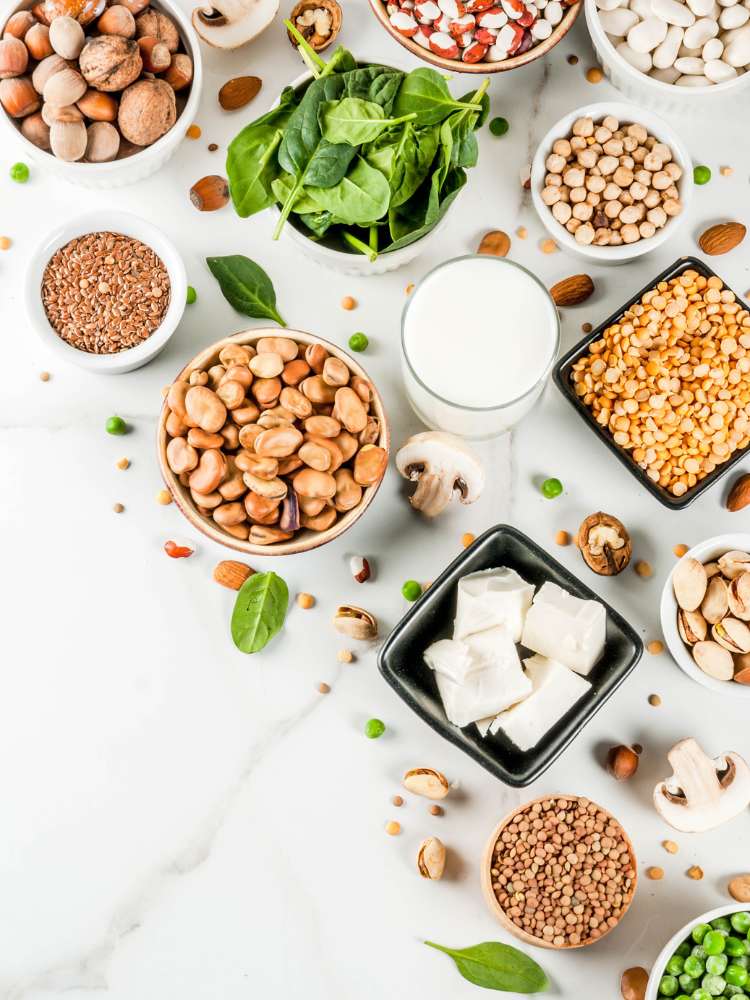The Right Food During Menopause: Boosting Your Health Naturally
Menopause is a transformative phase in every woman’s life, often bringing a wide range of physical and emotional changes. From hot flashes and mood swings to weight gain and fatigue, these symptoms can make this time challenging. However, I believe in the power of natural food and remedies to help manage these changes effectively.
The right nutrition can balance your hormones, support your metabolism, and make this transition smoother and healthier. Let’s explore how you can use natural, wholesome foods to feel your best during menopause!
Why Nutrition Matters During Menopause
As we age, our metabolism slows down, and hormonal fluctuations—particularly the drop in estrogen—affect various systems in the body. One of the most common concerns I hear from women is weight gain, especially around the belly area. This is a direct result of reduced estrogen, which can cause your body to store more fat especially around your mid section.
In addition, menopause increases the risk of osteoporosis and cardiovascular disease. Focusing on a balanced, nutrient-rich diet is key to maintaining your bone health, heart health, and overall well-being during this phase. What you eat can either support your body or make menopause symptoms worse. I’m here to show you how to use food as a tool to support your body naturally.
Best Foods During Menopause
Here are some of the key nutrients and foods I recommend to help you manage menopause symptoms and promote overall health:
1. Calcium and Vitamin D for Bone Health
As estrogen levels decrease during menopause, bone density tends to decrease too, leading to a higher risk of osteoporosis. Incorporating calcium-rich foods into your diet is crucial. Some of my favorite natural sources include:
– Leafy greens (like kale and collard greens)
– Almonds
– Sesame seeds and tahini
Vitamin D is equally important because it helps your body absorb calcium. While sunshine is one of the best sources of vitamin D, you can also find it in fortified foods like plant-based milk or fatty fish like salmon. If you struggle to get enough from your diet or lifestyle, I suggest considering a high-quality supplement.
2. Phytoestrogens to Balance Hormones
Phytoestrogens are plant-based compounds that can mimic the effects of estrogen in the body, helping to balance hormones naturally. They are found in foods like flaxseeds, soy, and chickpeas. Adding these to your meals can help reduce menopause symptoms like hot flashes and night sweats. Personally, I love starting my day with a smoothie that includes ground flaxseeds for a hormone-balancing boost (or I add the seeds to my yogurt bowl)!
3. Omega-3 Fatty Acids for Heart Health
Omega-3 fatty acids are powerful for reducing inflammation and supporting heart health—two things that become even more important during menopause. Incorporating fatty fish like salmon or mackerel into your diet is an excellent choice, as well as plant-based sources like walnuts, chia seeds, and flaxseeds.
Healthy fats are essential for keeping your body in balance, especially when it comes to managing your mood and energy levels. I always recommend adding avocado and olive oil to meals for an extra dose of these heart-healthy fats.
4. Fiber-Rich Foods for Digestive Health
Digestion often slows down during menopause, leading to bloating and discomfort. Fiber plays a crucial role in keeping your digestive system running smoothly and can help stabilize blood sugar levels, preventing energy crashes and cravings. Instead of starting your day with starchy carbs, I recommend opting for a nutrient-dense green smoothie or a yogurt with nuts. These options provide fiber, healthy fats, and protein to keep you satisfied and energized. You could also try a Breakfast Salad Bowl, one of my favorite recipes from my app, for a refreshing and fiber-packed start to your day.
5. Magnesium to Ease Stress and Improve Sleep
Magnesium is a mineral that plays a vital role in regulating mood and promoting better sleep—two things that can be tricky during menopause. I recommend including foods like spinach, pumpkin seeds, and yes, even dark chocolate (my personal favorite!). A small square of dark chocolate in the evening not only satisfies cravings but also gives you a natural magnesium boost.
Foods to Avoid or Limit During Menopause
While focusing on nutrient-rich foods is important, there are also certain foods you should consider limiting during menopause to reduce symptoms and support your health:
– Refined Sugar: Sugar can cause blood sugar spikes, which lead to energy crashes and can worsen mood swings. Instead, try natural sweeteners like honey or use fruits to satisfy your sweet tooth.
– Processed Foods: These foods often lack essential nutrients and can contribute to weight gain. Stick to whole, natural foods whenever possible.
– Caffeine and Alcohol: Both can trigger hot flashes and disrupt sleep. If you’re prone to these symptoms, try reducing your intake or switching to herbal teas.
Staying Hydrated
Hydration is essential, especially during menopause. Drinking enough water helps with digestion, improves skin health, and can even reduce the severity of hot flashes. I suggest aiming for at least 8 glasses of water per day, and you can also add herbal teas like chamomile or peppermint to your routine. These are soothing for the digestive system and can help calm the mind.
Natural Remedies for Menopause Symptoms
As you might know, I’m a big fan of natural remedies. There are some amazing herbs and supplements that can help support your body during menopause. Here are a few I often recommend:
– Black Cohosh: This herb is widely used for reducing hot flashes and balancing hormones.noch nie davon gehört, aber ich lerne auch immer wieder dazu 😉
– Evening Primrose Oil: Known for its ability to reduce breast tenderness and improve skin health during menopause.
– Red Clover: Another natural remedy rich in phytoestrogens that may help with hormonal balance.
Remember, before trying any new supplements, it’s always a good idea to consult with your healthcare provider to make sure they’re right for you.
Frequently Asked Questions (FAQ)
1. Can diet really reduce hot flashes?
Yes! Foods rich in phytoestrogens, like flaxseeds and soy, have been shown to help balance hormones and reduce the intensity of hot flashes. Staying hydrated and avoiding triggers like caffeine and alcohol can also make a difference.
2. How can I manage weight gain during menopause?
Focus on nutrient-dense, fiber-rich foods and healthy fats like avocado and olive oil. Regular physical activity, combined with the right food, can help manage your weight naturally during menopause.
Conclusion: Embrace Natural Health During Menopause
Menopause doesn’t have to be a difficult phase for your body. By choosing the right foods and natural remedies, you can support your health, balance your hormones, and thrive. Remember, every woman’s experience is unique, so listen to your body and give it the nourishment it needs.
If you’d like more personalized support, I’m here to help! My 1:1 coaching as well as the programs in my app are designed to provide you with a customized nutrition and fitness plan, tailored to your unique needs during menopause.
Let’s work together to help you feel strong and empowered!
Love,
Jana 💛🌱
The Right Food During Menopause: Boosting Your Health Naturally
Menopause is a transformative phase in every woman’s life, often bringing a wide range of physical and emotional changes. From hot flashes and mood swings to weight gain and fatigue, these symptoms can make this time challenging. However, I believe in the power of natural food and remedies to help manage these changes effectively.
The right nutrition can balance your hormones, support your metabolism, and make this transition smoother and healthier. Let’s explore how you can use natural, wholesome foods to feel your best during menopause!
Why Nutrition Matters During Menopause
As we age, our metabolism slows down, and hormonal fluctuations—particularly the drop in estrogen—affect various systems in the body. One of the most common concerns I hear from women is weight gain, especially around the belly area. This is a direct result of reduced estrogen, which can cause your body to store more fat especially around your mid section.
In addition, menopause increases the risk of osteoporosis and cardiovascular disease. Focusing on a balanced, nutrient-rich diet is key to maintaining your bone health, heart health, and overall well-being during this phase. What you eat can either support your body or make menopause symptoms worse. I’m here to show you how to use food as a tool to support your body naturally.
Best Foods During Menopause
Here are some of the key nutrients and foods I recommend to help you manage menopause symptoms and promote overall health:
1. Calcium and Vitamin D for Bone Health
As estrogen levels decrease during menopause, bone density tends to decrease too, leading to a higher risk of osteoporosis. Incorporating calcium-rich foods into your diet is crucial. Some of my favorite natural sources include:
– Leafy greens (like kale and collard greens)
– Almonds
– Sesame seeds and tahini
Vitamin D is equally important because it helps your body absorb calcium. While sunshine is one of the best sources of vitamin D, you can also find it in fortified foods like plant-based milk or fatty fish like salmon. If you struggle to get enough from your diet or lifestyle, I suggest considering a high-quality supplement.
2. Phytoestrogens to Balance Hormones
Phytoestrogens are plant-based compounds that can mimic the effects of estrogen in the body, helping to balance hormones naturally. They are found in foods like flaxseeds, soy, and chickpeas. Adding these to your meals can help reduce menopause symptoms like hot flashes and night sweats. Personally, I love starting my day with a smoothie that includes ground flaxseeds for a hormone-balancing boost (or I add the seeds to my yogurt bowl)!
3. Omega-3 Fatty Acids for Heart Health
Omega-3 fatty acids are powerful for reducing inflammation and supporting heart health—two things that become even more important during menopause. Incorporating fatty fish like salmon or mackerel into your diet is an excellent choice, as well as plant-based sources like walnuts, chia seeds, and flaxseeds.
Healthy fats are essential for keeping your body in balance, especially when it comes to managing your mood and energy levels. I always recommend adding avocado and olive oil to meals for an extra dose of these heart-healthy fats.
4. Fiber-Rich Foods for Digestive Health
Digestion often slows down during menopause, leading to bloating and discomfort. Fiber plays a crucial role in keeping your digestive system running smoothly and can help stabilize blood sugar levels, preventing energy crashes and cravings. Instead of starting your day with starchy carbs, I recommend opting for a nutrient-dense green smoothie or a yogurt with nuts. These options provide fiber, healthy fats, and protein to keep you satisfied and energized. You could also try a Breakfast Salad Bowl, one of my favorite recipes from my app, for a refreshing and fiber-packed start to your day.
5. Magnesium to Ease Stress and Improve Sleep
Magnesium is a mineral that plays a vital role in regulating mood and promoting better sleep—two things that can be tricky during menopause. I recommend including foods like spinach, pumpkin seeds, and yes, even dark chocolate (my personal favorite!). A small square of dark chocolate in the evening not only satisfies cravings but also gives you a natural magnesium boost.
Foods to Avoid or Limit During Menopause
While focusing on nutrient-rich foods is important, there are also certain foods you should consider limiting during menopause to reduce symptoms and support your health:
– Refined Sugar: Sugar can cause blood sugar spikes, which lead to energy crashes and can worsen mood swings. Instead, try natural sweeteners like honey or use fruits to satisfy your sweet tooth.
– Processed Foods: These foods often lack essential nutrients and can contribute to weight gain. Stick to whole, natural foods whenever possible.
– Caffeine and Alcohol: Both can trigger hot flashes and disrupt sleep. If you’re prone to these symptoms, try reducing your intake or switching to herbal teas.
Staying Hydrated
Hydration is essential, especially during menopause. Drinking enough water helps with digestion, improves skin health, and can even reduce the severity of hot flashes. I suggest aiming for at least 8 glasses of water per day, and you can also add herbal teas like chamomile or peppermint to your routine. These are soothing for the digestive system and can help calm the mind.
Natural Remedies for Menopause Symptoms
As you might know, I’m a big fan of natural remedies. There are some amazing herbs and supplements that can help support your body during menopause. Here are a few I often recommend:
– Black Cohosh: This herb is widely used for reducing hot flashes and balancing hormones.noch nie davon gehört, aber ich lerne auch immer wieder dazu 😉
– Evening Primrose Oil: Known for its ability to reduce breast tenderness and improve skin health during menopause.
– Red Clover: Another natural remedy rich in phytoestrogens that may help with hormonal balance.
Remember, before trying any new supplements, it’s always a good idea to consult with your healthcare provider to make sure they’re right for you.
Frequently Asked Questions (FAQ)
1. Can diet really reduce hot flashes?
Yes! Foods rich in phytoestrogens, like flaxseeds and soy, have been shown to help balance hormones and reduce the intensity of hot flashes. Staying hydrated and avoiding triggers like caffeine and alcohol can also make a difference.
2. How can I manage weight gain during menopause?
Focus on nutrient-dense, fiber-rich foods and healthy fats like avocado and olive oil. Regular physical activity, combined with the right food, can help manage your weight naturally during menopause.
Conclusion: Embrace Natural Health During Menopause
Menopause doesn’t have to be a difficult phase for your body. By choosing the right foods and natural remedies, you can support your health, balance your hormones, and thrive. Remember, every woman’s experience is unique, so listen to your body and give it the nourishment it needs.
If you’d like more personalized support, I’m here to help! My 1:1 coaching as well as the programs in my app are designed to provide you with a customized nutrition and fitness plan, tailored to your unique needs during menopause.
Let’s work together to help you feel strong and empowered!
Love,
Jana 💛🌱





